 Perhaps one of the most difficult tasks for an actress is to embody a character that's less a person than an idea or an essence. While it's not uncommon for a pretty, young performer to be expected to essay a role that is, in effect, a cartoon sketch of the idealized muse who instigates the real-er characters to action, it is all too rare to witness a really pretty, really young performer bring such a sketch of a character to memorably human life. One such rarity is before us this week as we consider...
Perhaps one of the most difficult tasks for an actress is to embody a character that's less a person than an idea or an essence. While it's not uncommon for a pretty, young performer to be expected to essay a role that is, in effect, a cartoon sketch of the idealized muse who instigates the real-er characters to action, it is all too rare to witness a really pretty, really young performer bring such a sketch of a character to memorably human life. One such rarity is before us this week as we consider...
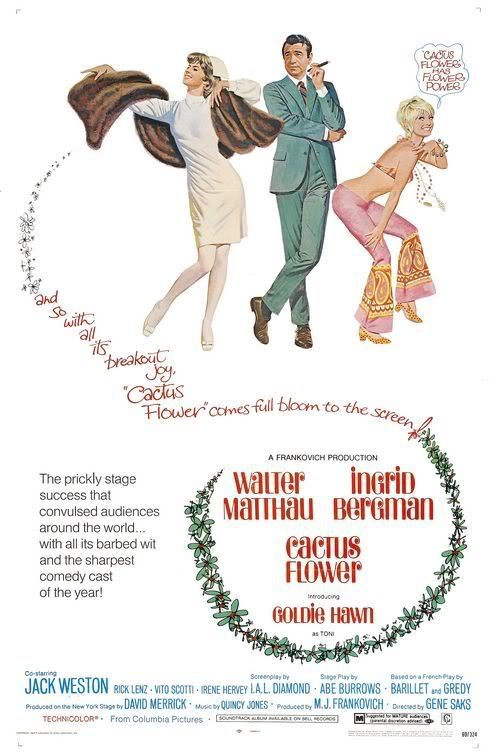
...Goldie Hawn in Cactus Flower (1969)
approximately 50 minutes and 33 seconds
14 scenes
roughly 49% of film's total running time
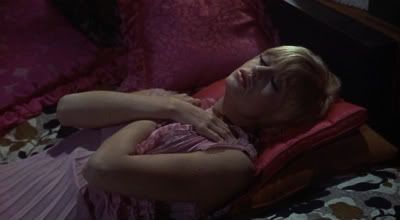 When we first meet Hawn's Toni, the young woman -- having been stood up by her sweetheart one too many times -- has determined that the only sensible solution is to commit suicide. Given that her kitchen stove is only a few feet from her daybed, it seems simple enough: blow out the pilot light, turn the gas way up, and recline in preparation for a tranquil departure from the mortal peril of heartbreak.
When we first meet Hawn's Toni, the young woman -- having been stood up by her sweetheart one too many times -- has determined that the only sensible solution is to commit suicide. Given that her kitchen stove is only a few feet from her daybed, it seems simple enough: blow out the pilot light, turn the gas way up, and recline in preparation for a tranquil departure from the mortal peril of heartbreak.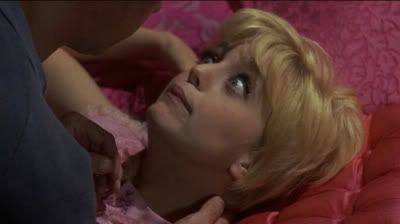 Toni's planned romantic tragedy is foiled when her neighbor, a supposedly bohemian playwright with the unlikely name of Igor Sullivan (Rick Lenz in an unremarkable performance), bursts into her apartment and rescues her with a kiss.
Toni's planned romantic tragedy is foiled when her neighbor, a supposedly bohemian playwright with the unlikely name of Igor Sullivan (Rick Lenz in an unremarkable performance), bursts into her apartment and rescues her with a kiss.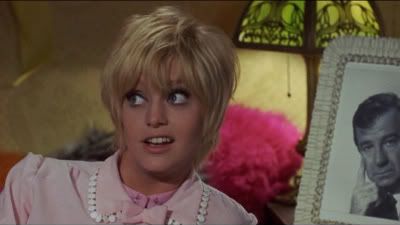 Hawn's Toni is not entirely pleased by this turn of events. And as she shares her dismay with Igor, we learn the basic contours of her romantic conundrum. Toni fell in love with Julian because she can't stand liars and Julian was so forthright with her about being married. What Toni doesn't know, and which subsequent scenes soon clarify, is that Julian isn't married at all and that his ruse of being married was designed explicitly to keep things simple between him and Toni. However, in the most familiar of farcical twists, Julian has begun to fall in love with Toni and now must find some way to dismantle his own duplicity without losing his pure-hearted beloved forever. Julian happens also to be completely unaware that his devoted nurse Stephanie (the legendary Ingrid Bergman, surprisingly adept in this light comic role) is completely in love with the dentist. From this scenario, much ostensibly comic deception ensues, with (natch) Bergman's Stephanie being pressed to pretend to be Julian's wife so that Julian might convince the sweet-hearted Toni that she's not a "house-breaker." Thus, Bergman's Stephanie arrives to visit Hawn's Toni at her workplace, where the nurse endeavors to convince the shopgirl that the wife has no qualms about divorcing the dentist.
Hawn's Toni is not entirely pleased by this turn of events. And as she shares her dismay with Igor, we learn the basic contours of her romantic conundrum. Toni fell in love with Julian because she can't stand liars and Julian was so forthright with her about being married. What Toni doesn't know, and which subsequent scenes soon clarify, is that Julian isn't married at all and that his ruse of being married was designed explicitly to keep things simple between him and Toni. However, in the most familiar of farcical twists, Julian has begun to fall in love with Toni and now must find some way to dismantle his own duplicity without losing his pure-hearted beloved forever. Julian happens also to be completely unaware that his devoted nurse Stephanie (the legendary Ingrid Bergman, surprisingly adept in this light comic role) is completely in love with the dentist. From this scenario, much ostensibly comic deception ensues, with (natch) Bergman's Stephanie being pressed to pretend to be Julian's wife so that Julian might convince the sweet-hearted Toni that she's not a "house-breaker." Thus, Bergman's Stephanie arrives to visit Hawn's Toni at her workplace, where the nurse endeavors to convince the shopgirl that the wife has no qualms about divorcing the dentist.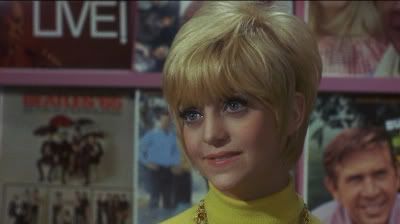 Hawn's Toni discerns the truth embedded in Stephanie's deception (that the Bergman character is secretly in love with Matthau's). This truth moves the tender-hearted pixie to silent, gloopy tears. (The moment when Hawn licks the tears from her own upper lip is both adorable and strange, an extended intimate moment in which the camera seems utterly infatuated with both Hawn and her character.)
Hawn's Toni discerns the truth embedded in Stephanie's deception (that the Bergman character is secretly in love with Matthau's). This truth moves the tender-hearted pixie to silent, gloopy tears. (The moment when Hawn licks the tears from her own upper lip is both adorable and strange, an extended intimate moment in which the camera seems utterly infatuated with both Hawn and her character.)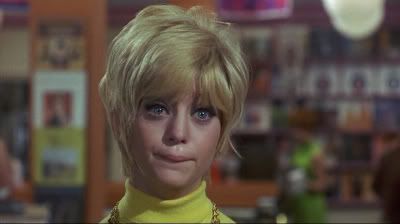 The comic conceit of Cactus Flower derives from the fact that Toni is a naif, an innocent enmeshed in the cynical machination of adult affairs. Moreover, her talent as a busybody ends up driving the action of the piece, with each instance of her empathetic meddling unveiling the essential truths concealed by the principal characters.
The comic conceit of Cactus Flower derives from the fact that Toni is a naif, an innocent enmeshed in the cynical machination of adult affairs. Moreover, her talent as a busybody ends up driving the action of the piece, with each instance of her empathetic meddling unveiling the essential truths concealed by the principal characters.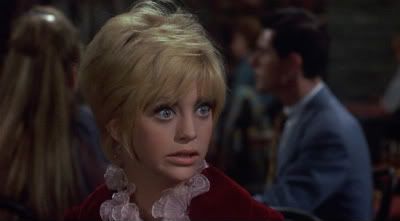 It's nearly entirely to Hawn's credit that this hoary, middle-brow sex comedy works as well as it does. The film is about as salacious and daring as a subplot on The Love Boat. (The one oblique reference to homosexuality conveys how utterly prudish this film actually is. When questioned by Julian about wearing hotpants to work, Hawn's Toni replies: "Nobody around here looks. Most of our customers are classical.")
It's nearly entirely to Hawn's credit that this hoary, middle-brow sex comedy works as well as it does. The film is about as salacious and daring as a subplot on The Love Boat. (The one oblique reference to homosexuality conveys how utterly prudish this film actually is. When questioned by Julian about wearing hotpants to work, Hawn's Toni replies: "Nobody around here looks. Most of our customers are classical.")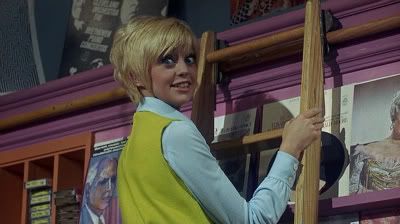 Hawn anchors her characterization of Toni within the actress's own flirtatious, dingbatty charisma. In Hawn's performance, the fact of Toni's delusional conviction that she alone understands everything becomes a feature of the character's endearing appeal, not proof of her idiocy.
Hawn anchors her characterization of Toni within the actress's own flirtatious, dingbatty charisma. In Hawn's performance, the fact of Toni's delusional conviction that she alone understands everything becomes a feature of the character's endearing appeal, not proof of her idiocy.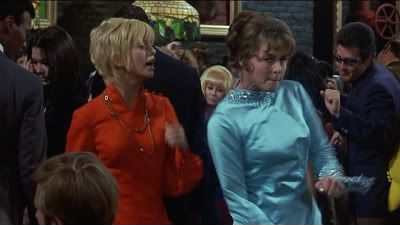 Even Ingrid Bergman (in a performance I found surprisingly pleasant) is subject to Hawn's curious charisma.
Even Ingrid Bergman (in a performance I found surprisingly pleasant) is subject to Hawn's curious charisma.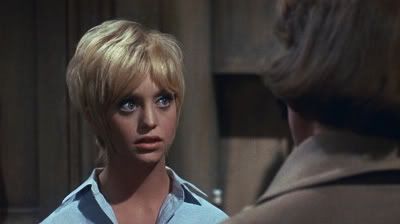 In the one scene that permits Hawn's Toni any possibility of adult consciousness -- when Bergman's Stephanie arrives to tell Hawn's Toni the truth behind all Julian's deceptions -- Bergman balks. For even Bergman's Stephanie, Hawn's Toni is an innocent to be protected, a precious savant whom no feeling person wants to hurt or to harm.
In the one scene that permits Hawn's Toni any possibility of adult consciousness -- when Bergman's Stephanie arrives to tell Hawn's Toni the truth behind all Julian's deceptions -- Bergman balks. For even Bergman's Stephanie, Hawn's Toni is an innocent to be protected, a precious savant whom no feeling person wants to hurt or to harm.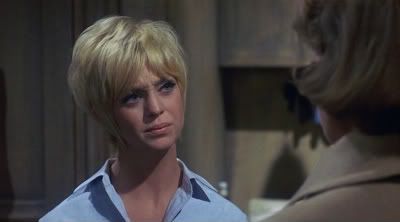 Yet the truth does come out and, befitting this unconventional comedy's utter conventionality, the couples realign in ways fitting the social propriety of age and social position (Toni dumps Julian for all his deception, thus permitting Stephanie and Julian to finally get together while also making it possible for some generationally-appropriate free love between the pixie and the playwright.)
Yet the truth does come out and, befitting this unconventional comedy's utter conventionality, the couples realign in ways fitting the social propriety of age and social position (Toni dumps Julian for all his deception, thus permitting Stephanie and Julian to finally get together while also making it possible for some generationally-appropriate free love between the pixie and the playwright.)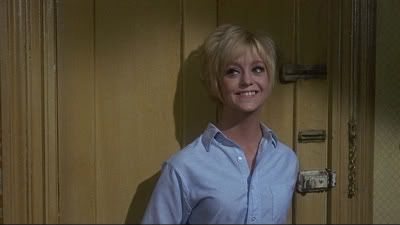 Hawn's work in Cactus Flower is perfectly apt, a possibly ideal performance of this curious concoction of a character. Hawn conveys the dimensions of affect necessary for Toni -- uncommon charisma, emotional simplicity, infectious charm -- in ways that are beyond impressive for a screen "debut," and entirely separate from banal criteria like "depth" and "arc." (Indeed, the next time you hear someone say something to the effect of -- "they don't give Oscars for being cute" -- I would immediately offer this nomination/win as compelling evidence to the contrary.) The role asks simply that Hawn be impossibly yet believably cute, to embody an essence that the rest of the characters seek to preserve and protect and, on this count, Hawn's performance definitely nails it. I'm not sure it's "great work," but it is certainly a memorably vivid performance of a subtly difficult role.
Hawn's work in Cactus Flower is perfectly apt, a possibly ideal performance of this curious concoction of a character. Hawn conveys the dimensions of affect necessary for Toni -- uncommon charisma, emotional simplicity, infectious charm -- in ways that are beyond impressive for a screen "debut," and entirely separate from banal criteria like "depth" and "arc." (Indeed, the next time you hear someone say something to the effect of -- "they don't give Oscars for being cute" -- I would immediately offer this nomination/win as compelling evidence to the contrary.) The role asks simply that Hawn be impossibly yet believably cute, to embody an essence that the rest of the characters seek to preserve and protect and, on this count, Hawn's performance definitely nails it. I'm not sure it's "great work," but it is certainly a memorably vivid performance of a subtly difficult role.

5 comments:
I've always found Goldie Hawn to be an underrated actress. Between this, Butterflies are Free, the first half of Overboard, The First Wives Club and Everyone Says I Love You she was a fantastic comedienne. I was really surprised when I saw Cactus Flower that it's actually a pretty decent film despite all the awful hippie stuff and Walter Matthau. Ingrid Bergman is one reason it works (who knew she could let loose this much?) but Hawn really deserves most of the credit. It's not terribly in-depth (and it doesn't have to be) but she plays the best "dumb" blonde since Jean Hagen in Singin' in the Rain.
I'm glad you gave Hawn the major props I believe she deserves for Flower. Hawn is wonderous, and Oscar-worth, too- this performance is a great example of how the acting Oscar awards should be given out, not on the basis of how good the movie is, but on how fine a performer is in a movie, be it good or bad. One might dismiss the film as a piece of piffle, but it's short-sighted to overlook what Hawn manages to pull off in it.
I've seen it again last week and although I found the film to be cute & wacky, I didn't enjoy Goldie's performance. I believe she was especially bad in the first scenes (where writing also didn't help at all) and it spoiled it for me. I thought Ingrid was more effective & funny.
And the next evening I saw Last Summer (HATED IT! the ending made me puke), and compared to Catherine Burns's monologue, Goldie's Oscar win looks like a joke. I'm curious how Dyan Cannon is gonna play for me...
I liked this film despite myself. Ingrid Bergman is, indeed, quite good - I really enjoyed her attempts at dancing (in fact, I thought the subtle spoofing of '60s dance styles - made clear by Igor's "Who knows, the foxtrot might someday come back in style" line - was very clever and entertaining!). Goldie Hawn probably got the Oscar for that tear-licking moment alone.
Alex - I'm surprised you didn't like "Last Summer"! Such a daring, complex and challenging film.
I was just posting about Goldie and Cactus Flower...Ingrid Bergman's "Pull the Tooth" dance has become one of my moves!!
Post a Comment